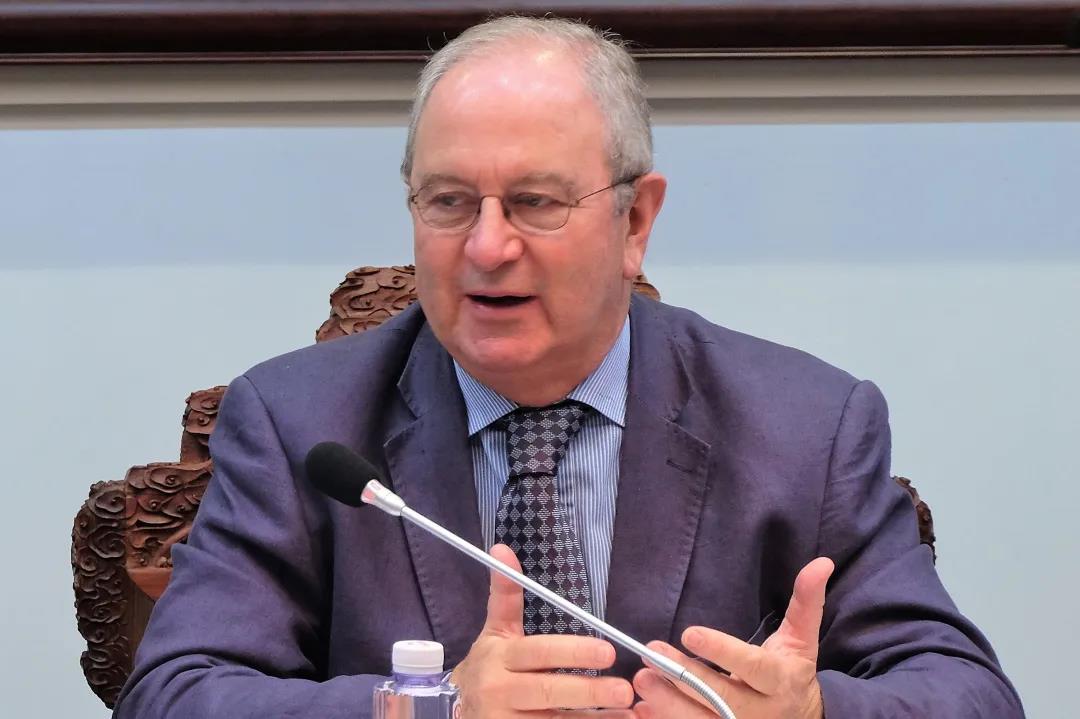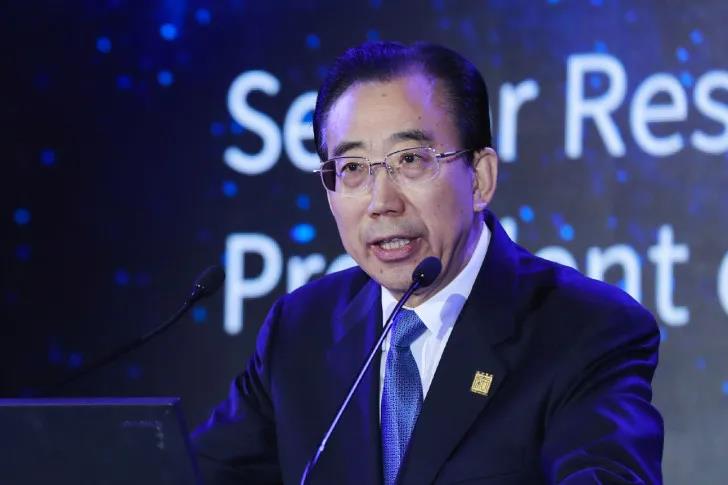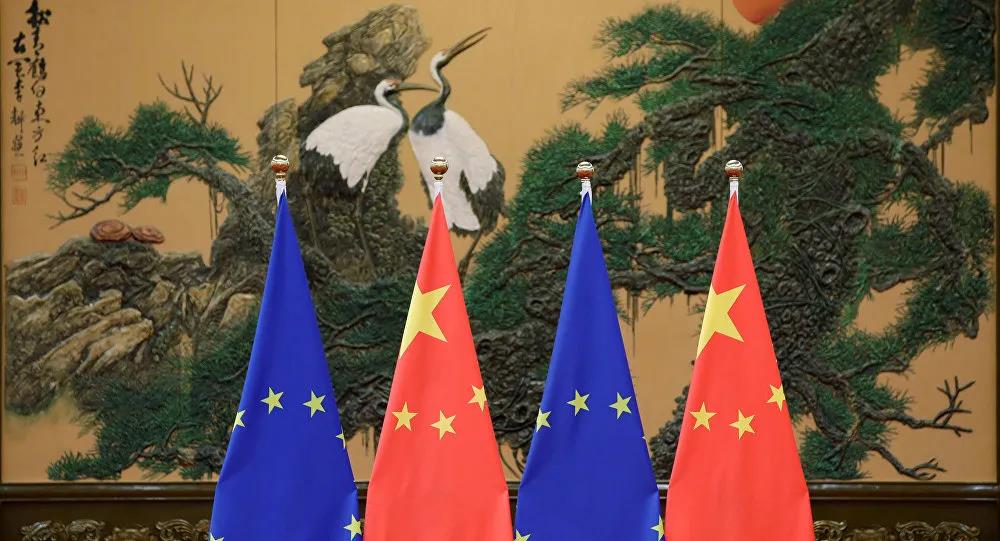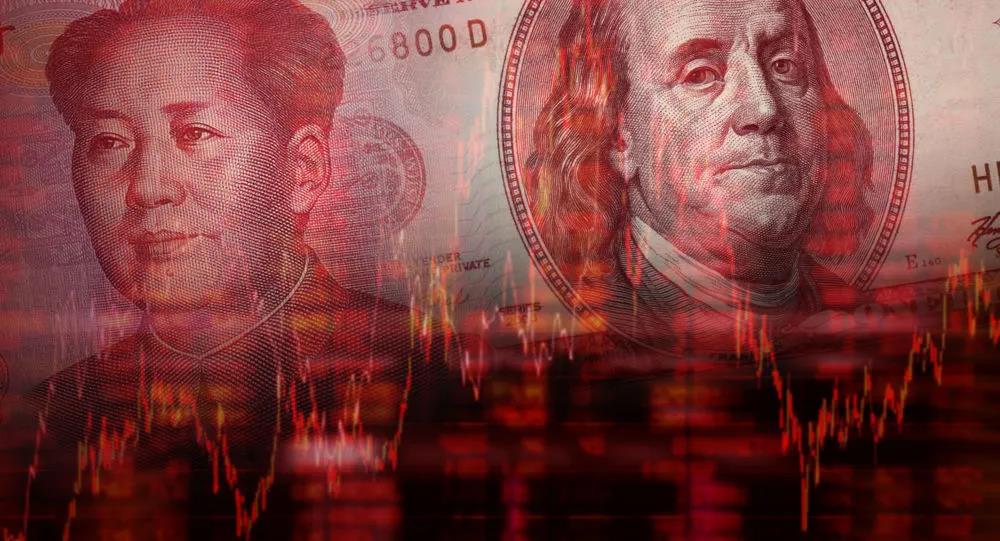China and the EU Need to Work together despite their Differences
June 08, 2020
A brief introduction to the interlocutors:
Geoffrey Harris, visiting professor of the College of Europe, former official of European Parliament, executive director of the European Parliament Liaison Office with the United States Congress (2010-2016), visiting scholar at Fudan University (2017).
Wu Hailong, senior fellow of the Taihe Institute, president of China Public Diplomacy Association.
(Credit: sputniknews)
I. During the period when COVID-19 was ravaging Europe, China provided it with various forms of assistance to combat the epidemic. Some has characterize China’s aid as “propaganda diplomacy” and “mask diplomacy”. What are your views on this?
Geoffrey Harris:
Events have moved very fast and all countries face common challenges mixing the issues of assistance, cooperation with political messages is not really helpful. It is perfectly reasonable for China to draw attention to assistance provided to Europe in this crisis. Indeed, some the assistance concerns items imported by China at an earlier stage of the pandemic which now seems to be receding in China.
It is not clear exactly when the virus began to cause such human suffering but it is clear that for the months and years ahead all humanity will have to face up to the uncertainty and danger of COVID-19. Before the pandemic began to affect Europe it was already causing huge problems in China, most notably in Hubei province. EU countries provided assistance to China. At that time China was importing millions of masks from Europe and even the US. None of this was accompanied by any kind of political messaging.
Earlier Commission President Von der Leyen stated her view that “China has not forgotten that in January... the EU helped, today, we are the centre of the coronavirus outbreak pandemic, and we need protective equipment ourselves”.
Wu Hailong:
In the fight against the COVID-19, China has provided more than 150 countries and international organizations with batches of much-needed medical supplies, many to Europe and especially to Italy after its domestic outbreak. When Italy’s request to the EU for medical supplies was rejected, China, despite its still remaining difficulties, lent a helping hand to Italy by providing imperative protective supplies such as masks and sending a medical team to the country. Why did China do that? I think there are two main reasons: One is the long-held Chinese philosophy of reciprocating an act of kindness. In the early days of the outbreak, Italy helped China, so the latter was grateful deep down. Seeing Italy in need of help, China did not sit back without doing anything. The second reason is that China pursues the idea of a community with a shared future for mankind. The virus knows no borders or races. In the face of a raging epidemic, no country can stand alone or be immune to the virus. The virus is a common enemy of all mankind, and all countries must work together and help each other to flatten the epidemic. As a result, China immediately took actions to be part of the global anti-epidemic efforts, even when its domestic epidemic was not yet completely under control. China has sent anti-epidemic materials, dispatched medical teams, and selflessly shared its experience in epidemic treatment as well as prevention and control to Europe and the world. A joint experts group has also been established between China and Europe. China is well aware that helping other countries equals to helping itself as well. By helping those in need, China lives and breathes the concept of a community with a shared future for mankind. Some in the West who believe that China’s aid is “propaganda diplomacy” or “mask diplomacy” are demonstrating the attitude of, as a Chinese saying goes, “To gauge the heart of a gentleman with one’s own mean measures”.
II. The recent international stigmatization of China over COVID-19 has given China the blame for the outbreak, and some European media even proposed the need to investigate China and request compensation from it, which has followed by the hype from some European press. What do you think of this?
Personally, I find any kind of “blame game” unhelpful. Some of the language and unfounded allegations coming from U.S. leaders is also unnecessarily provocative and seems designed to distract attention from the failure of the U.S. Administration to get any kind of grip on the outbreak in the U.S. itself as this is now, by far, the worst in the whole world.
It remains, however, absolutely clear that the world needs to know how this horrendous tragedy started. It is therefore very difficult for Europeans to understand why China is not ready to take part in an international inquiry on the origins of the outbreak. That seems to me to be the only way of ensuring that relevant lessons art learnt as quickly as possible. Sometimes there is hype in the press and political grand-standing, but the basic point is undeniable: the world needs to know what happened. That is not, in any way, to stigmatize China or its leadership.
Wu Hailong:
Recently, some politicians in the U.S. have repeatedly attacked China over the epidemic. There are accusations that “China has covered up the epidemic”, “the virus came from a laboratory in Wuhan, China”, “China’s data is opaque”, “China has delayed the release of the epidemic information, causing the spread of the virus”, “China should be held responsible for the worldwide spread of the virus”, “China should be investigated, China should be prosecuted, and China should be held accountable for compensation” and so on. For a while, China appeared to be the “culprit” in the outbreak.
What I want to say is that the outbreak is a natural disaster, of which China has also been the victim. The virus we face this time is an unknown virus that requires a process of study and understanding. In the early days of the outbreak, it would also have been irresponsible for China to immediately declare a pandemic simply based on a few confirmed cases.
Comparatively speaking, China’s response has rarely been matched by any other countries in terms of the speed, scale, and the measures it has implemented. China also did not hesitate to share the gene sequence, making an important contribution to accelerating vaccine R&D. UN Secretary General Guterres stated that the Chinese people “have made contributions to all mankind”. According to The Lancet, an authoritative international medical journal, the rapid containment of the virus in China has set an encouraging example for other countries. As to the origin of the virus, the world’s leading medical experts almost unanimously believe that the virus originated from nature, not from human beings.
China has always made the relevant information open and transparent. COVID-19 cases were diagnosed on December 27, 2019 for the first time, and the situation was reported to the WHO and relevant U.S. prevention and control agencies on January 3, 2020. From January 3 to February 3, China had kept providing the U.S. with the latest information about the epidemic as well as prevention and control measures 30 times in total. Since January, China has published information of confirmed cases, death tolls and suspected cases every day and held all kinds of press conferences concerning the epidemic more than 3,000 times. How come such efforts are being stigmatized as tardy and opaque? He who has a mind to beat his dog will easily find his stick. Why do some politicians in the U.S. spare no effort to stigmatize China? I think the most fundamental reason is that the U.S. has repeatedly failed to deal successfully with its domestic epidemic, making it the world’s most seriously affected country and causing widespread dissatisfaction among all walks of life throughout U.S. society. Some politicians in the U.S., in order to shirk their own responsibilities and divert domestic attention, blame China for the serious consequences caused by the U.S. government’s failure to handle the epidemic. According to media reports, the Republican National Committee has sent a 57-page memo to the party to encourage Republican candidates to respond to the outbreak by aggressively attacking China. The White House’s National Security Council has also drawn up talking points for American officials to blame China for the outbreak. These disgraceful practices of certain American politicians will not easily deceive the public, but can only make people more aware of their shamelessness.
As for investigations and accountability claims, looking back into history, the Spanish flu pandemic began from the U.S., resulting in a huge disaster. However, has the U.S. ever been held accountable? AIDS was first found in the U.S., and although 75 million people worldwide have been infected and 35 million have died, has the U.S. ever given compensation? The 2008 global financial crisis was caused by the U.S., but has it compensated for the global economic losses? When it comes to investigations, China does not object to scientific, professional, and impartial investigations led by the WHO, but it is the U.S. that should be investigated in the first place. Despite the U.S. having advanced technology and a complete medical system, why has its number of infections and death rate topped the world? Were any COVID-19 cases found amid the influenza outbreak in the U.S. last winter? Stigmatizing others can’t save the U.S. itself. American politicians would do better to focus on issues of epidemic prevention and control in order to save lives!
European politicians and media should exercise their own rational thinking and independent judgment, and should not follow in the footsteps of U.S. politicians and public opinion. China and the EU should work together to combat the epidemic and jointly build a community of shared human health.
(Credit: sputniknews)
III. The impact of the outbreak on the global economy and society has been enormous, and Europe has been hit hard as well. Reviving the economy and restoring confidence are the most pressing issues facing all countries. In this regard, how do you think China and Europe can cooperate?
I would say that the impact of the outbreak on the global economy and on society has already proved devastating and I fear that there will be no quick turn around. Each country, region and city needs a stable economic environment in order to begin planning for recovery. The figures on economic growth and unemployment are already very worrying and so the restoration of confidence will not be easy at all. China and Europe must try to maintain and strengthen their strategic partnership. It is most unfortunate that the Covid-19 crisis has led to the postponement of important meeting which could have contributed to this process. For example, an early agreement on an EU-China Bilateral Investment Treaty would provide a real signal of the strength and potential of this relationship. In spite of political differences, China and the EU agree that interdependence is the way forward precisely to ensure that the peoples of both sides benefit and in this way together can contribute to global economic growth and the resistance of protectionism and nationalist rhetoric which are so damaging.
Wu Hailong:
Since the outbreak, China and Europe have given strong support to each other’s efforts to combat the epidemic. Now the virus is still spreading, and in order to contain the global spread of the virus as soon as possible, it is imperative for the two sides to strengthen information sharing, exchange anti-epidemic experiences and practices, cooperate internationally in testing methods, clinical treatment, and vaccine R&D, and spare no efforts to prevent cross-border contagion.
The epidemic has had a huge economic and social impact on China and Europe. China’s economy shrank by 6.8% in the first quarter, and the economies of major European countries have declined sharply, with foreign trade shrinking, investment reducing, consumption weakening, unemployment rates soaring, and the global industrial chain also suffering severely. These are both challenges for China-EU cooperation and important historical opportunities.
Firstly, China and Europe could consider strengthening cooperation in global public health governance. The two sides could reinforce coordination and cooperation in improving the public health safety governance system, responding to public health emergencies and the storage and allocation of relief materials. Secondly, China and Europe could coordinate in strengthening international macroeconomic policies to safeguard the stability of the global industrial supply chain. Thirdly, the two sides share common interests in safeguarding multilateralism and free trade, and could strengthen cooperation in supporting multilateralism centered on the UN and the WTO. China and Europe could adopt more open and flexible measures to expand trade and investment between the two sides and should sign the EU-China Comprehensive Agreement on Investment as soon as possible. Fourthly, China and Europe could further develop cooperation on global climate change. Both parties could jointly develop clean energy technologies to promote green and sustainable solutions. In addition, there is plenty of room for them to cooperate in, among other areas, finance, science and technology, education, culture, food, and energy security.
IV. This year marks the 45th anniversary of the establishment of diplomatic relations between China and the EU. Although China and Europe have differences and contradictions, they have many common interests in safeguarding multilateralism and promoting trade liberalization. Both sides should enhance communication and understanding, strive to manage differences and upgrade China-EU relations to a new level of cooperation. What are your expectations of, and suggestions for, the future development of China-EU relations?
Geoffrey Harris:
Progress in EU-China relations has slowed down in recent years and this trend must be reversed. Transparency, agreement on common rules and equal opportunities are essential to achieving progress. Anyone who deliberately encourages mistrust between Europe and China does a disservice to the millions of people concerned.
In 2019 already the EU presented a strategy paper identifying many areas for cooperation between China and the EU. As Josep Borrell the EU Foreign Policy leader put it “This is not a paper seeking to heighten tensions between China and the EU, but a document that objectively assesses the relation between both giants with all its pros and cons”. “The EU has always addressed China on the basis that good friends are able to talk frankly about their disagreements and reach compromises at the negotiation table.”
His basic approach confirmed the EU’s readiness to continue pragmatic, constructive engagement with China, but he added a clear message that since joining the WTO in 2001 “China has entered the world, but the world has not entered in China to the same extent. ‘The Belt and Road Initiative’ is the expression of a new phase in the relationship between China and the rest of the world: China is no longer a developing country, but a world power.”
The dramatic events of 2020 confirm this basic reality. The EU is looking with increasing concern at the escalating war of words between the leaders of China and the U.S. and will not take sides. It will, however, be vigilant in defending and enhancing its own interests while always stressing its readiness to enhance global cooperation. U.S. and Chinese leaders’ absence from the Virtual Global Vaccine Summit on May 4th 2020 hosted by the EU was a disappointment but also a signal that the EU will act in every way possible to contribute to cooperation in humanity’s common fight to end the pandemic and revive the global economy.
Wu Hailong:
During the 45 years since the establishment of diplomatic relations between China and Europe, their bilateral relations have developed considerably. Based on the principles of mutual respect and benefit, both sides have achieved remarkable results in practical cooperation in all fields. China’s policies towards Europe remain highly stable and consistent, and China has consistently supported the process of European integration and Europe’s unity and stability. As two major world powers, markets and civilizations, China and Europe play an irreplaceable and important role in safeguarding world multi-polarization, supporting multilateralism, and securing free trade. However, frankly speaking, China-EU relations are generally driven by economic interests, with mutual political trust remaining insufficient, and there are differences in ideology and values. In particular, the documents on China policy published last year by the EU defined China as an “institutional adversary”, showing increased suspicion in the EU towards China with a negative effect on the deepening of China-EU cooperation. Therefore, China and the EU should take the 45th anniversary of their establishment of diplomatic ties as an opportunity to strengthen in-depth communication and exchange at both political and strategic levels, reduce suspicion, enhance mutual trust, control differences, and consolidate the cognitive foundation of cooperation between the two sides. There is still great potential for China-EU cooperation in various fields. The two sides should handle their cooperative relations in a rational and mature way. As long as ideology and values are not considered as preconditions for cooperation between the two sides, the prospects for China-EU cooperation will be very extensive. The healthy and stable development of China-EU relations is in line with the fundamental interests of both sides. As an active supporter of China-EU relations, I sincerely hope that the 45th anniversary of the establishment of diplomatic ties between China and the EU will serve as a new historical starting point and propel China-EU relations to a new level with a long-term strategic perspective.
I don’t fully agree with what you said about Borrell. The more than forty years of China’s reform and opening up are times that not only saw China entering the world but also the world entering China. China’s opening door will only grow larger and wider, with its degree of opening becoming increasingly broad. It is neither objective nor feasible to blindly insist that the world should enter China to the same degree. Borrell believes that China is no longer a developing country, which truly flatters China. China is a developing country, not only in its political orientation, but also in objective reality. Although China’s economy is the second largest in the world, per capita GDP is only a quarter of that of EU countries. By UN standards, China only ranks around 80th in the world. Nonetheless, China is indeed a world power, and China will not shirk or evade its responsibility as a great power. You mentioned that the leaders of the U.S. and China were absent from the online “global vaccine summit” held by the EU, about which I do not know the specific details, but the fact that China did not attend the meeting does not mean that China objects to the research and development of vaccines throughout the world. Chinese President Xi’s recent speech at the opening ceremony of the World Health Assembly made it very clear that China supports international cooperation in vaccine R&D, and, after being put into use, China’s vaccine R&D will be offered as a global public product. This is the clear proof of China’s willingness to work together with other countries throughout the world and shows its resolute attitude towards the joint fight against the epidemic.
—————————————————————
ON TIMES WE FOCUS.
Should you have any questions, please contact us at public@taiheglobal.org



